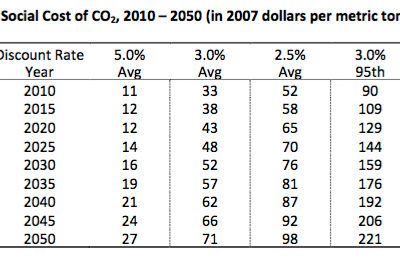Climate Policy in India
What’s Happening in the World’s Second Largest Country?
India is home to 1.39 billion people, just below China but growing faster. By some projections, it will have the second largest economy in the world by 2050. In terms of climate policy, however, it doesn’t get nearly as much attention as China. That’s understandable in terms of India's current carbon emissions, which are now only a quarter of China’s. But we need to be more forward-looking. Currently, India’s power system is heavily tilted toward coal generati...
CONTINUE READINGWhose Interests Count? And How Much?
Whether to consider harms to foreign countries and future generations is controversial. So is how much weight to give harm to the poor.
Should regulators take into account harm to people in other countries? What about harm to future generations? Should we give special attention when the disadvantaged are harmed? These questions are central to climate policy and some other important environmental issues. I’ll use cost-benefit analysis as a framework for discussing these issues. You probably don’t need my help in thinking about the ethical issues, so instead I’ll focus on legal and economic considera...
CONTINUE READINGAn Abundance Research Agenda
If we need to build lots of things fast to address climate and housing crises, how will we do that?
There’s been a lot of buzz about this column by Ezra Klein in the New York Times. Klein’s basic argument: We need to do a lot of infrastructure and other development projects to make the world a better place. For example, we’ll need to build power lines and renewable projects to address climate change. But our current legal and political system obstructs development projects too much, and we need to change that: We need to build more homes, trains, clean ene...
CONTINUE READINGWill public power advance decarbonization?
Increasing public control of energy systems may not facilitate decarbonization
Over the past few years, there has been a push in both Europe and the United States for a “Green New Deal” in which decarbonization efforts would be pushed by aggressive, direct government investments in clean energy technology and infrastructure. But in much of the United States and in Europe, large portions of the electricity system (which is crucial to decarbonization goals) are in private ownership. Would greater public control or even nationalization of thes...
CONTINUE READINGA Beautiful Day for Bumblefish?
A California court just ruled that bumblebees are fish. It’s not as crazy as it sounds.
A California appeals court ruled last week that bumblebees are fish and are therefore protected by the California Endangered Species Act (CESA). That may sound ridiculous, but there's actually a convoluted legal argument to support the court. That argument does justify giving the CESA some extra coverage beyond what we would ordinarily classify as fish. Making the statute stretch far enough to cover bumblebees, however, is a bit too much. The CESA explicitly covers...
CONTINUE READINGAdvancing renewables through electricity restructuring
Reducing barriers to siting new electricity generation can help advance renewable energy production
Our electricity system will be crucial to decarbonization efforts, both because much of our current energy comes from electricity, and because decarbonizing sectors like transportation will require significant electrification. And electricity is the sector where we have had the most success in decarbonization so far in the United States. But there is still more to do. And in an increasingly polarized country, direct policy efforts to decarbonize our electricity sy...
CONTINUE READINGProtecting the federal estate
Understanding the Property Clause's location in Article IV clarifies the power of Congress and the federal government to protect public lands
In my previous blog post, I discussed how the location of the Property Clause in Article IV can help answer key debates about congressional versus executive power under the Clause, as well as federal versus state power under the Clause. Here I want to draw on the principles I developed in the prior blog post: the role of the Clause in resolving interstate disputes and advancing horizontal federalism, and the relative primacy of congressional versus executive power unde...
CONTINUE READINGTaking Article IV Seriously
How “horizontal federalism” can help us understand federal power over the public lands
Can the President unilaterally end fossil fuel leasing on federal lands? Or does this policy decision require Congressional intervention? Can the President unilaterally terminate existing National Monuments that protect federal public lands from development? Or does this policy decision also require Congressional intervention? Does federal law preempt state law on federal lands? Or does the Constitution require the transfer of all federal lands to a state when ...
CONTINUE READINGOur Common Ground
New book on history of federal public lands is an essential contribution
America’s public lands are a national, and even international, treasure. Over a quarter of the United States is owned and managed by the federal government. Public lands provide recreational opportunities for all Americans. They provide valuable habitat for species and ecosystems. They provide important natural resources, such as timber and minerals, that are both important for local economies, and for national industrial policy. (For instance, federal public...
CONTINUE READINGRemembering Dale Goble
“Father of Wildlife Law” passed away this spring
Dale Goble, professor of law at University of Idaho, passed this April. There are numerous excellent tributes to Dale’s life, available here, here, and here. As a co-author of Dale’s on our Wildlife Law casebook, I wanted to add my personal recognition of his life and work. When I first started teaching law over 15 years ago, one of my first courses was a Biodiversity Law class. Protection of biodiversity is what prodded me to going to law school, and to wor...
CONTINUE READING





